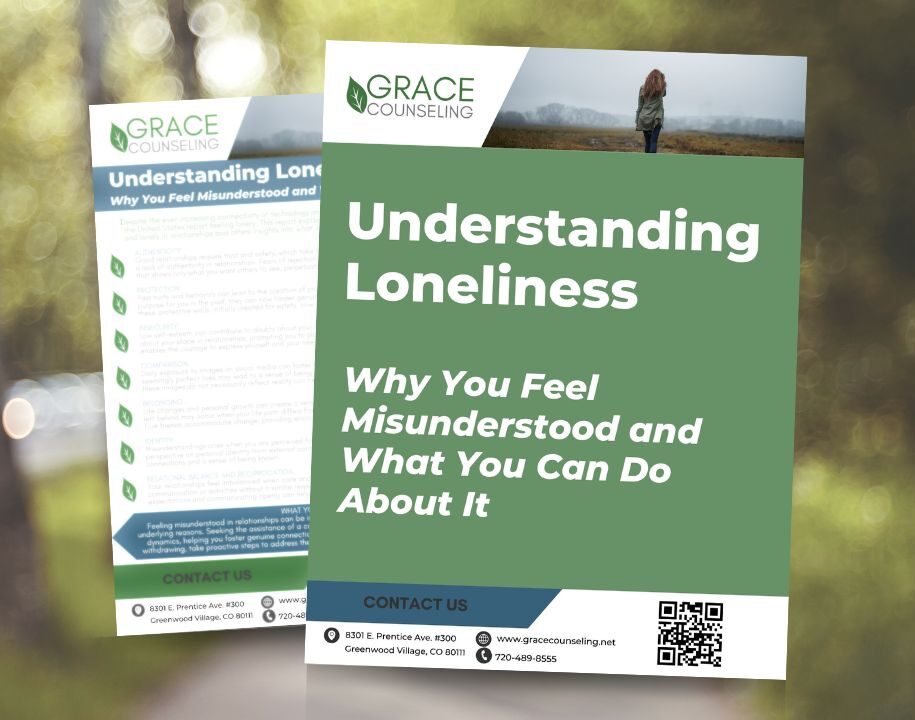From the comfort of your own home or set apart space, therapy can now come to you — anywhere in the state of Colorado.
Is Online Counseling Right for Me?
I have health concerns
Health concerns make traveling or being in close proximity with others difficult
It's too far to drive
The drive to our office in Greenwood Village, CO, is simply too far, or perhaps you live in a remote part of the state
I need a counselor with experience
The counselors in your area don’t have the experience or expertise you need
Life is busy
The demands of work or juggling the needs of your family leave you with limited time to step away
Online just sounds better
You have a unique mental or physical health challenge, and the idea of virtual therapy puts you more at ease
I'm anxious about coming into the office
You’d be more comfortable doing therapy from your home than coming into our office
What You Need to Know about Online Services:
- Mental health care is more accessible
- Our online meeting platform is secure, confidential, and HIPAA compliant
- Great video and audio connection makes it feel like an in person session
- Our clinicians have training and experience using the virtual platform
- Online is as effective as in person
- You can save time and money on your commute to and from our office

Want to know more?
Online Counseling Q&A’s:
Research in this area is still evolving, but findings suggest online counseling is at least comparable to in-person services (“Telehealth for Mental Health Professionals”, PESI). Teletherapy has been shown to be effective in treating individuals, couples, families, and groups surrounding a wide variety of issues (anxiety, depression, PTSD, addiction, and more). In some cases, treatment can occur more quickly with telehealth, and clients find the financial and time-saving benefits advantageous. Most important, however, is your intentional engagement, as the American Medical Association has found that positive outcomes in teletherapy heavily depend on the engagement of the client.
Advantages include greater flexibility in scheduling and greater privacy, which may lower the fear of stigma. Some children and teens may feel more comfortable in the familiarity of their home or room. Moreover, telehealth allows people who may otherwise be unable to access therapy services to be cared for. For example, telehealth has proven highly adaptable to meet the needs of those with disabilities.
The same factors that contribute toward a successful therapy session translate into online therapy, and a majority of skills and interventions used for care during an in-person session remain effective in online therapy.
Preparing a calm and private environment for your online counseling session is one of the most important parts of getting the most from your time. We encourage you to find a confidential space that is free from distraction, so that you are able to communicate as freely as possible during your session. If this type of private space is difficult to establish, try placing a noise machine outside the door of your meeting place to drown out noise. The use of headphones can also help with privacy.
If your child or teen is participating in online therapy, check in with your therapist about items to have readily available. Toys, games, or paper and markers to color with are common tools therapists may want to incorporate with your child during session.
Next, we’ve found that for in-person therapy, the driving time to and from the office is a useful mental and emotional transition time for clients. Yet, for online sessions, this transition time needs to be intentionally created. Try taking a few minutes to gather your thoughts and needs before your session, and if time allows, plan to also take a few minutes for yourself after your session is over.
Finally, your devices and internet play a huge role in the success of your session. Make sure you have a strong internet connection, your device is charged or connected to power, your notifications are silenced, and that you have a back-up plan established with your therapist if connection gets lost. If possible, place your device on a solid surface so that your screen is stable—this avoids the potential of motion sickness for you and your therapist.
Many of Grace’s clinicians have received education around the use of online platforms for therapy, and participate in consultation in order to continually learn and grow. Main areas of training involve securing confidentiality and HIPAA compliance, risks of technology use, ethical issues, client screening for suitability for teletherapy, intervention effectiveness and competence, boundaries, and more. Don’t hesitate to ask your therapist about their training or any specific concerns or questions.
Therapy, in general, can bring unpleasant thoughts and emotions to the surface. But processed with the help of your therapist, this experience can lead to greater healing and freedom. The same risks apply to online counseling.
For those who are already feeling a great sense of isolation or withdrawal from society, the distance of online counseling may amplify this feeling and in-person therapy may be a more helpful setting. Additionally, crises or emergency situations are not well-suited for teletherapy, as a therapist is hindered from appropriately intervening. Moreover, if you are struggling with suicidal thoughts please let your therapist know immediately, as it is highly important to adapt and implement an effective safety plan and assess suitability for teletherapy.
The short answer is … just about everyone! Our staff is experienced in conducting online counseling sessions with every age group, in addition to individual, couple, family, and group formats. If you have questions about your specific situation, please contact us. Also, check the website for our most current listing of online groups.
While online counseling offers accessibility to many, some limitations may occur. For example, children under the age of five may be better suited for therapy in person at our office. Most importantly, your therapist is responsible for your safety and the safety of those around you. Depending on the severity of your symptoms and presenting issues, your therapist may recommend an in-person setting.
The main difference between online and in-person counseling involves experiencing the direct presence of your therapist when meeting face to face. The distance through your screen can make subtle nonverbal cues difficult to notice, and you may feel a slight difference in personal connection, just as they way you feel limited when speaking to a loved one over the phone or video call. Meeting in person can more greatly enhance your therapist’s ability to understand what words sometimes struggle to describe. Because of this, we recommend the use of video during online sessions whenever possible. Phone calls do not show any nonverbal cues (facial expressions or body language) and can sometimes limit the therapist’s ability to accurately understand your communication. However, as mentioned above, the success of an online session is greatly connected to your intentional engagement during treatment. Finally, despite the personal distance between you and your therapist, other aspects of therapy remain unchanged including the quality of your care, the nature of therapy, and the unique implementation of your treatment.
ALL locations served in Denver Metro area including but not limited to: Denver, Littleton, Lakewood, Morrison, Golden, Highlands Ranch, Centennial, Parker, Lone Tree, Castle Rock, Castle Pines, Aurora, Arvada, Wheat Ridge, Westminster, Broomfield, Lafayette, Louisville, Thornton, Northglen, Erie, Commerce City
ALL locations served across Colorado including but not limited to: Longmont, Boulder, Fort Collins, Greeley, Loveland, Fort Morgan, Sterling, Monument, Colorado Springs, Pueblo, Canon City, Alamosa, Leadville, Idaho Springs, Dillon, Silverthorne, Steamboat Springs, Breckenridge, Vail, Aspen, Glenwood Springs, Grand Junction, Montrose, Buena Vista, Fairplay, Salida, Gunnison, Durango, Trinidad, Lamar















